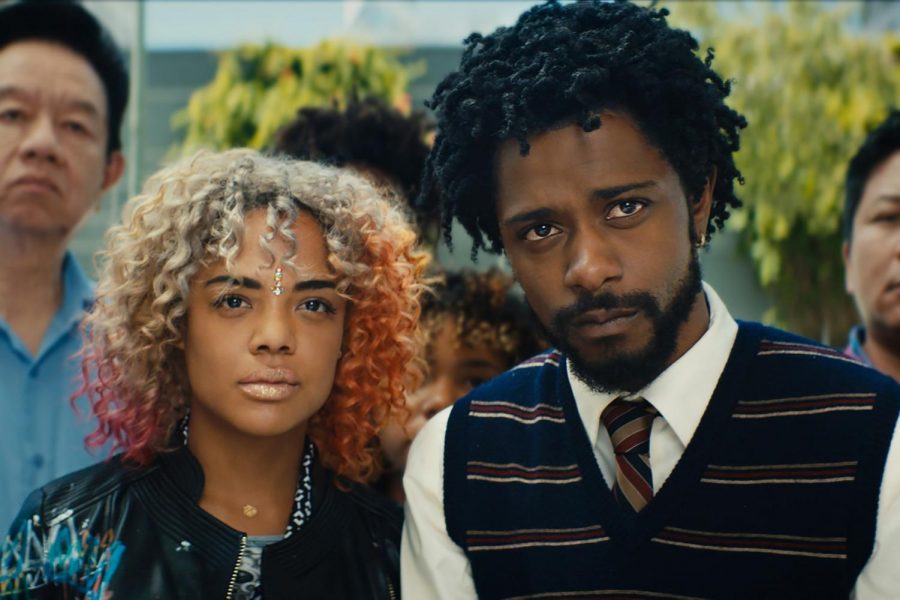Race Seen Through Three Lenses
Courtesy of Annapurna Pictures
Tessa Thompson and Lakeith Stanfield in “Sorry To Bother You.”
September 17, 2018
Movies of the summer like “Blindspotting,” “Sorry to Bother You” and “BlacKkKlansman” are making waves in more ways than one. These rule-breaking, genre-warping feats of imagination brought refreshing variety, demonstrating on a minute-yet-notable scale how film is branching out from typical iterations of stories that focus on race.
These films are complex, each having so much to offer purely in terms of style and vision that they are slowly and steadily altering our perceptions of what a movie that deals with race can be. “Blindspotting,” “Sorry to Bother You” and “BlacKkKlansman” show us that a movie about race doesn’t have to be confined to the Civil Rights Era to be relevant. These inventive films, like their equally impactful period-piece counterparts, are becoming catalysts for conversations that have so long thirsted to be had.
“Blindspotting,” the magnum opus of Tony and Grammy award-winning Daveed Diggs and acclaimed poet Rafael Casal, follows Collin Hoskins (Diggs) as he tries to navigate a minefield of bureaucratic traps during his last three days of probation. This task is not made any easier by his best friend Miles (Rafael Casal), who, being white in a rapidly gentrifying Oakland, feels a constant pressure to prove his street cred. Miles’ desire for legitimacy, as we later find out, contributed to Collin’s first stint in jail.
In this film, Diggs and Casal strike a unique and affecting balance between dramatization and that which is true to life. We see a stark contrast between the very intimate trauma Collin begins to experience after witnessing a police shooting and the relatively detached reaction from the outward Oakland community, a kind of desensitization that feels all too familiar in our society.
“Blindspotting” is punctuated with jabs at green juices and Vespas, providing well-timed relief without negating the film’s own thematic weight. Additionally, the syntactical choice to have the climactic scenes of the film in verse promotes deeper analysis.
It is a film that doesn’t claim to have all the answers but instead encourages viewers to look within themselves and acknowledge their own ignorances — their own blind spots. Plus, it’s really funny.
Boots Riley’s “Sorry to Bother You ” — set in an absurdist, present-day Oakland — tells the story of Cassius “Cash” Green (Lakeith Stanfield), a young black man trying to make the come up in the world of telemarketing. Initially floundering and unsuccessful, Cash receives the advice from a veteran telemarketer to use his “white voice” when trying to make sales. No surprise it works, and that’s when the madness ensues.
From peeling lamps to picket line-crossing to bacchanalian parties at the home of a sarong-wearing, coke-snorting CEO psychopath (Armie Hammer), who made his fortune peddling slavery under a different name, “Sorry to Bother You” doesn’t just bring to light — it showcases, in what feels like a massive supernova — the consequences of unchecked capitalism as well as the reality that for so many African Americans, their success in professional spheres directly depends on their ability — or inability — to disguise their blackness. The film’s elements of magical realism don’t distract the viewer from its moral implications, but rather highlight them through stunning juxtaposition. “Sorry to Bother You” is poignant social commentary wrapped in a neat little acid trip package.
Lastly, in iconic Spike Lee fashion, recent release “BlacKkKlansman” brings it all to the table, and lets the viewer know that it brings it all to the table. The film, based on a true story, is the epic of Ron Stallworth (John David Washington), the first black detective hired at the Colorado Springs Police Department, and his crusade to infiltrate the city’s local chapter of the Ku Klux Klan over the phone. Stallworth recruits a white officer (Adam Driver) to assume his place at the in-person Klan meetings.
With intense cross-cuts and a score that raises hairs, as well as the tracking shot emblematic of Blaxploitation films from the early 1970s, Spike Lee keeps his newest film visceral, raw and almost too relevant for its own good.
“BlacKkKlansman” forces us to confront a truth we may have forgotten — that a quiet, virulent hate stirs deep within America’s underbelly. The events of the film may have taken place in the 1970’s, but the final sequences of footage from the 2017 Unite the Right rally jolt us back into an eerily similar present, reminding viewers how highly adaptable, and therefore unrelenting, racism truly is.
At a very basic level, it is easy to draw comparisons between these films, like how “Blindspotting” and “Sorry to Bother You” are set in Oakland or how the latter and “BlacKkKlansman” hinge on the main character’s ability to convincingly sound white. On a larger level, all three films include versions of the black male experience and yet, they each create distinctively different entry points for audiences.
A version of this article appeared in the Sept. 17 print edition. Email Elizabeth Crawford at [email protected].



























































































































































